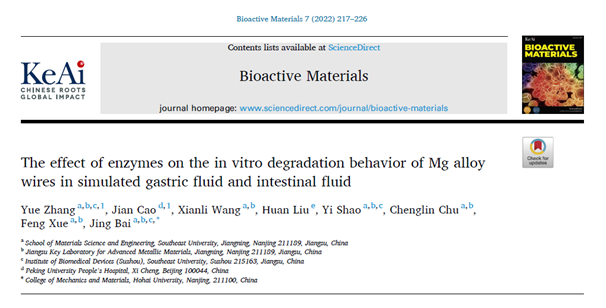Gastroenterology | Dr. Cao Jian’s Team Provides New Perspective on Clinical Application of Magnesium Alloy Implanted Devices for Digestive Tract
2022-04-19
In January 2022, Dr. Cao Jian, from the Department of Gastroenterological Surgery at Peking University People's Hospital, collaborated with Dr. Zhang Yue and Prof. Bai Jing, from the School of Materials Science and Engineering at Southeast University, published their new research, titled “The effect of enzymes on the in vitro degradation behavior of Mg alloy wires in simulated gastric fluid and intestinal fluid”, in top international journal Bioactive Materials (IF:14.593).

In recent years, with an upsurge of biodegradable metal implants, the research and application of Mg alloys in the gastrointestinal environment of the digestive tract have been of great interest. However, unlike the body fluid and blood environment, the gastrointestinal environment is more complex. The gastrointestinal tract consists of the stomach, small intestine, and large intestine. There are some obvious differences between their internal environments due to their different roles in the digestive process, including pH value, digestive enzymes, and ion concentration. These differences brought challenges to the clinical application magnesium alloy implanted devices for the digestive tract.
To understand the role of different digestive enzymes in the degradation of magnesium, the researchers investigated the effect of digestive enzymes, pepsin and pancreatin, on the degradation behavior of Mg-2Zn alloy wires based on the simulated gastric and intestinal fluids. The results showed that the pepsin and pancreatin had completely different even the opposite effects on the degradation of Mg, although they both affected the degradation product layer. The degradation rate of Mg wire declined with the addition of pepsin in simulated gastric fluid (SGF) but rose with the addition of pancreatin in simulated intestinal fluid (SIF). The opposite trends in degradation rate also resulted in completely different degradation morphologies in wires surface, where the pitting corrosion in SGF was inhibited because of the physical barrier effect of pepsin adsorption. In contrast, the adsorption of pancreatin affected the integrity of magnesium hydrogen phosphate film, causing a relatively uneven degraded surface. The research findings may help us to understand the role of different digestive enzymes in the degradation of magnesium and facilitate the development and clinical application of magnesium alloy implanted devices for the digestive tract.
Dr. Cao Jian, from the Department of Gastroenterological Surgery at Peking University People's Hospital, and Dr. Zhang Yue, from the School of Materials Science and Engineering at Southeast University, are the co-first authors of the article. Prof. Bai Jing, from the School of Materials Science and Engineering at Southeast University, is the corresponding author. This work was supported by the National Key Research and Development Program of China, the National Natural Science Foundation of China, the Science and Technology Project of Jiangsu Province, the Technological Innovation of key Industry of Suzhou, and the open research fund of Jiangsu Key Laboratory for Advanced Metallic Materials.
Paper Link: https://pubmed.ncbi.nlm.nih.gov/34466728/

